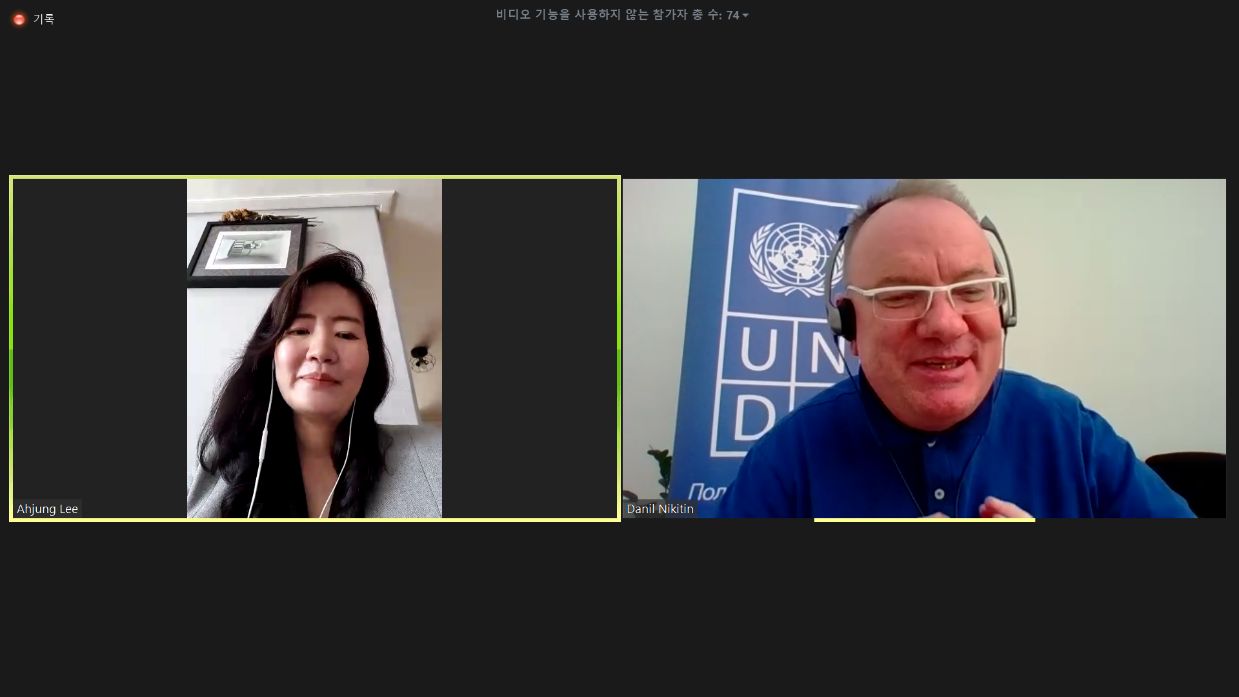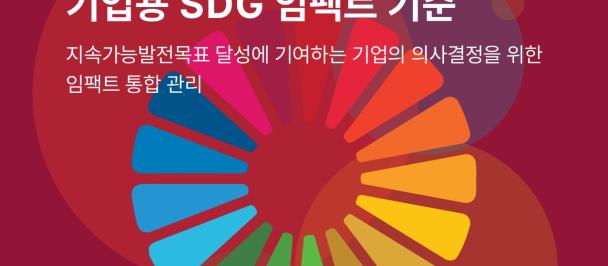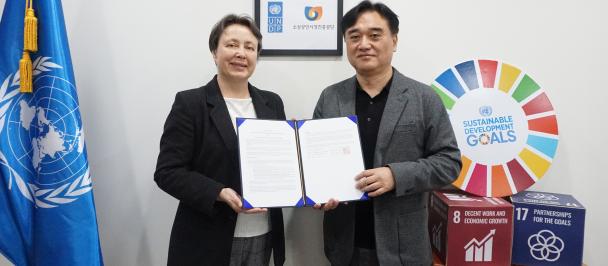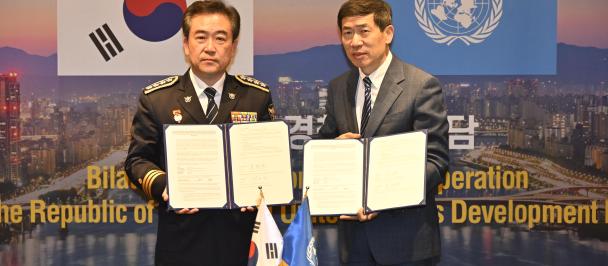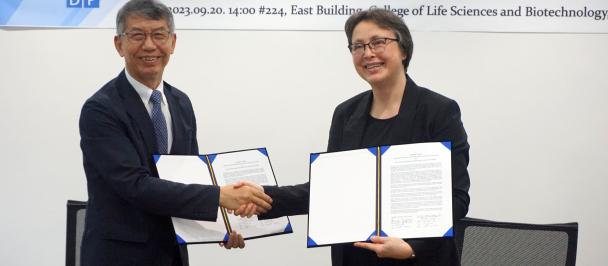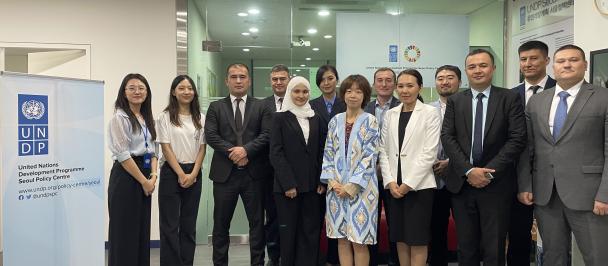In partnership with the Ministry of Labor and Social Development of the Kyrgyz Republic and UNDP Kyrgyzstan, the Global Research Institute (GLORI) Foundation organized a web-based conference on 20 May 2020 titled “Integration of an Intervention Model on Prevention of Gender-based Violence (GBV) in Crisis Centers’ Activities in the Kyrgyz Republic”.
The web-conference presented the implementation progress and findings from the UNDP Seoul Policy Centre (USPC)’s SDG Partnership programme on addressing GBV in Kyrgyzstan. The SDG Partnership is USPC’s signature programme which facilitates knowledge exchange between Korea and partner countries on effective support mechanisms for survivors of GBV. The webinar shared the findings from a study conducted by GLORI through a survey of GBV survivors who received support from community-based Crisis Centers in Kyrgyzstan. With 125 participants, the webinar also featured information on support mechanisms for GBV survivors in other countries, namely Kazakhstan, Ukraine, Russia, and India.
Ms. Aliza Soltonbekova, Deputy Minister of Labor and Social Development of Kyrgyzstan, highlighted the borderless nature of GBV surge during the COVID-19 emergency situation and the Ministry’s commitment to “promote wide discussion with different countries” to address the issue. Ms. Jenty KirschWood, UNDP Deputy Resident Representative in Kyrgyzstan, noted that UNDP Kyrgyzstan “[hopes] that today’s event will further inspire replication of global good practices and will be continued in other initiatives in Kyrgyzstan like the EU-funded Spotlight Initiative on GBV and by other participants at the regional and international levels.” Ms. Ahjung Lee, Policy Specialist at USPC, highlighted the power of knowledge exchange, noting that “Although there is no perfect model, there is value in sharing successes, challenges, as well as lessons learned.”
As part of the SDG Partnership programme, UNDP Kyrgyzstan, the GLORI Foundation, and the Crisis Centers Association in Kyrgyzstan have worked collaboratively to introduce an integrated approach in supporting GBV survivors in six community-based Crisis Centers, using the Sunflower Center - Korea’s integrated service center - as a reference point. Korea’s Sunflower Center is a one-stop service model that provides multi-disciplinary services, including medical, legal, counseling, and police investigation support, to GBV survivors in a single location. The initiative in Kyrgyzstan incorporates both the Sunflower Center and WINGS (Women Initiating New Goals for Safety) models to reflect the specific country contexts of Kyrgyzstan. The latter model is designed by the Columbia University School of Social Work and is applied in six community-based Crisis Centers that are partners of the SDG partnership. The WINGS model provides services or treatment tailored to the specific needs of GBV survivors by categorizing survivors according to the type and severity of violence they had experienced. The core elements of the WINGS model include victim-centered safety plans and support services, screening violence, social support for victims, victim empowerment, and awareness-raising on all forms of violence. The two models complement each other —the Sunflower Center model focuses on the multi-stakeholder collaboration and institutional settings of integrated service centers; the WINGS model provides a mid to long-term support approach considering the individual socio-economic situations of survivors.
Ms. Sonheong Jang, Programme Officer at USPC, delivered a presentation on the Sunflower Center model and the lessons learned from Korea’s integrated service centers. The presentation highlighted key aspects of integrated public service for survivors of GBV: 1) developing an effective management structure to ensure that multi-disciplinary practitioners work truly as a team; 2) designing a sustainable funding mechanism at the outset for a sustainable and high-quality service provision for GBV survivors; 3) recruiting and retaining highly trained staff on GBV; and 4) developing service standards and concrete standard operating procedures for each job group for the delivery of consistent and reliable high-quality services in all integrated centers.
Ms. Tolkun Tiulekova, Executive Director for the Crisis Centers Association of Kyrgyz Republic, presented the preparation and implementation of the project, including the selection process of six community-based Crisis Centers, capacity-building of the Centers, and awareness-raising activities on GBV and integrated service mechanism.
Mr. Danil Nikitin, Chairperson of GLORI, shared the study findings based on a survey conducted on 89 beneficiaries of the project in 2019. Beneficiaries were surveyed twice at intervals in order to compare their state before and three months after the intervention. Compared to the baseline survey, the rate of exposure to various forms of violence (sexual, physical, verbal, or psychological) had been reduced while the rate of service utilization had increased. The findings showed the contribution of the WINGS-Sunflower Center model to achieving one of the core elements of support, namely increased empowerment of the victims. The survey showed that support sessions helped the victims by treating them with dignity and increasing their self-perception as an independent decision-maker. Higher rate of service utilization, from legal support to employment counseling, and increased trust in the intervention also pointed to the more proactive recovery of victims. In addition, the study identified survivors’ challenges in accessing medical services and reporting their cases to the police due to fear of stigmatization and lack of confidence in law enforcement. The study findings will be used as an advocacy tool for a public-private partnership in establishing integrated service centers for GBV survivors, as well as mobilizing support from the police and medical institutions in addressing the challenges identified in the study.
The web-conference provided a platform to take stock of the SDG partnership in Kyrgyzstan and share lessons learned not just from Korea and Kyrgyzstan, but also other countries — facilitating meaningful South-South knowledge exchange on integrated support mechanism for GBV survivors. This was also evident in the post-event feedback survey, where 97% of the conference participants replied that USPC’s presentation on the Sunflower Center model was relevant and applicable to their own country contexts. Following the webinar, GLORI “plans to conduct more in-depth interviews to specify the demands [of beneficiaries] and collect qualitative data,” as noted by Mr. Danil.
Related Resources:
- Video recordings and presentation materials: https://glori.kg/en/wings-sunflower-conference-agenda/

 Locations
Locations